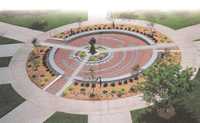
Jennie Mitchel Kellogg
is honored with a Medium Paver from Jennie Mitchell Kellogg Circle Ltd., Tracy Applegate, Ann K. Branden, Jill Bremyer-Archer, Jo Ann Butaud, Shirley K. Calvin, Lori Callahan, Carol Foreman, Yvette Leerskov Gardner, Natalie G. Haag, Martha Hodgesmith, Barbara A. Lundin, Cecilia T. Mariani, P.A. McDonald, Anne B. Miller, Marla Luckert Morse, Ellen G. Neufeld, Cinda Norberg, Linda S. Parks, Nancy Parrish, Rachael K. Pirner, Janice D. Russell, Rebecca A. Sanders, Alma F. Sanford, Carol Park Thompson, Kimberly Gee Vines, Barbara M. Weians, and Darla S. Zink.
The Jennie Mitchell Kellogg Circle is a state-wide women attorneys association with approximately 100 members. This association is organized to promote the following:
A. The efficient administration of justice and the constant improvement of the law, especially as it relates to women;
B. To encourage the advancement, education and support of women in the legal profession;
C. To encourage the participation of women in professional and bar organizations, particularly at the committee and officer level;
D. To promote equality and social justice for all people;
E. To improve relations between the legal profession and the public; and
F. To provide women attorneys with a supportive environment to network professionally.
Annually in July, the Jennie Mitchell Kellogg Circle puts on a statewide women attorneys conference in Lindsborg, KS. The 10th anniversary conference will be held in 1999.
Jennie Mitchell Kellogg was the first woman admitted to the practice of law by the Supreme Court of Kansas. She was in the private practice of law in Emporia and became the first woman Assistant Attorney General in the United States.
Jennie was born March 4, 1850 in Coshocton, OH, the eldest daughter in a family of eight. Jennie was very close to her father, Reverend Daniel P. Mitchell, a well known Methodist minister and a prominent figure in Kansas politics in the 1860s and 1870s. Jennie was an "inseparable companion of her father." It was said that her closeness to him gave her her character and strength. Jennie was also influenced by her father's profession and entered the seminary.
In 1867, while in the seminary, Jennie married Benton P. Arthur. Mr. Arthur died of tuberculosis five years later. After his death, Jennie moved to Kansas and lived with her family in Leavenworth, Topeka, Ft. Scott, and Emporia. It was in Emporia that she met Lyman B. Kellogg.
Mr. Kellogg was the first president of the Kansas State Normal School (now Emporia State University). He then became a lawyer, was elected to the state senate, and was serving as probate judge when he married Jennie on June 11, 1878. Jennie was his second wife, and became the mother of his two sons, Vernon and Fred. Layman and Jennie had three children of their own-- Mary, Joseph and Charles.
On February 3, 1881, Jennie signed the roll of the Kansas Supreme Court list of lawyers as Mrs. J.M. Kellogg. She was officially admitted to the Bar on June 9, 1881.
During their marriage, Lyman and Jennie practiced law together as Kellogg and Kellogg in Emporia. Two of their sons also practiced law with them intermittently throughout their careers. In 1889, Lyman was elected Kansas Attorney General. Jennie became his First Assistant Attorney General. Together their focus was on enforcement of the prohibition laws. It was noted that Mr. Kellogg was "the first Attorney General in Kansas to make a real fight for the enforcement of the prohibition law and he was ably supported by his assistant, Mrs. Kellogg." This, unfortunately, was his downfall. After losing the election for second time, it was said: "His political enemies defeated him for reelection on this issue not some of them said, that they cared so much about the enforcement of the law, as they object to petticoat government."
Jennie was an influential member of the Kansas Federation of Women's Clubs. In addition, it was once said that her best work was done in the chautauquas. Jennie was a noted lecturer and spoke on topics such as "Does Citizenship pay?" and "The Legal Status of Kansas Women." It was said that she was a leader and had become "a power for good" in the Emporia community. It was noted that "no other Kansas woman has done so much as she to bring the standard of women's influence to its present high plane in Kansas as Mrs. Kellogg." It was also written that she had "the keenest mind of any woman who had ever lived in Emporia." She was described as having a studious bent of mind and strong mentality. It was also stated in newspapers of the day that she was a splendid cook and housekeeper, an accomplished needlewoman, and that her children were always well dressed. In city and school board matters, where at that time women had the vote, Jennie was also a leader. It was written that she was "always sensible, always reasonable, always effective."
At her death, it was written that "her life was so full and so well rounded that in many respects she may be regarded as the best product the womanhood of these western prairies has contributed to contemporary civilization. Yet she was not unique nor peculiar. She was a prophecy of what may be expected of women as the century grows older." Jennie died in May, 1911. The Emporia Gazette wrote that the entire Lyon County Bar attended her funeral. It is unknown whether the closing hymn at her funeral was tongue-in-cheek. It was "Crossing the Bar."
Reprinted from the JMKC Newsletter, Winter 1996
For more information about the Jennie Mitchell Kellogg Circle, please contact Linda Parks at (316) 265-7761, Rachael Pirner at (316) 630-8100 or Darla Zink at (316) 828-4139.
September 17, 1998










